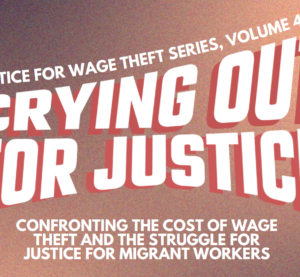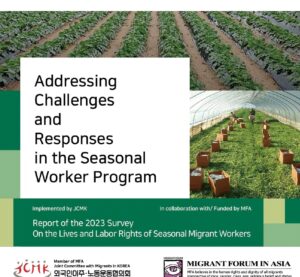Circular No. 15: Global Compact for Migration: 1st Intergovernmental Negotiations Meeting
— March 2, 2018We are writing with regard to the recently concluded first intergovernmental negotiations on the Global Compact for Safe, Orderly and Regular Migration (GCM).
On 20, 22-23 February 2018, the first round of the negotiations meeting was held at the United Nations Headquarters in New York. The discussions were based on the zero draft of the Global Compact for Safe, Orderly and Regular Migration (GCM) which was released to the public on 5 February 2018 by the co-facilitators namely the Ambassador and Permanent Representatives to the United Nations of the governments of Mexico and
Switzerland. The meeting was attended by government representatives of the different Member-states of the United Nations as well as delegations from the civil society and other stakeholders.
The provisions in the zero draft were divided into three days. For the morning session of the first day, the general statements of the Member-states were delivered as well as the preamble, vision and guiding principles of the zero draft. The afternoon session focused on objectives 1-6. The second day focused on discussing objectives 7-17. The last day focused on objectives 18-22 as well as the implementation and follow up and review of the zero draft of the Global Compact.
General Comments
There were a number of states who emphasized that the GCM should have a human rights approach with a firm focus on women, children, domestic workers, people with disabilities and other groups in vulnerable situations. Some states highlighted the need to emphasize and address the vulnerabilities faced by migrant workers. The GCM should also have a people-centered approach which the zero draft has. Some states also mentioned the need for a state-led approach. The Government of China noted that there is also a need to look into the human rights of the citizens of destination countries.
However, they noted that putting international human rights of all above national rights and sovereignty is not a good thing.
On the non-legally binding nature of the GCM, there were states who voiced that the language used in the actionable commitments should be more in line with the nature of the compact. For example, the government of Singapore suggested for the terms “consider”, “aim”, “encourage”, to be used instead of “commitment” as this is much more aligned with the nature of the compact. There were also states who mentioned that all member states have a role to play in managing migration and their participation should be balanced. However, in the GCM, states must still be able to retain their sovereign rights.
The government of Mali commented that the GCM looks into migration from south – north. They mentioned that it should take into consideration the south – south migration movement of people as some of the provisions that were written (i.e. digital data) is not available in their country.
In terms of gender, states emphasized the need to highlight this aspect throughout the provisions in the Global Compact.
Member-states called for the importance of shared responsibility in the whole governance of migration as this cannot be addressed by one state alone. In line with this, the European Union highlighted that despite the fact that there may be differences in terms of positions or opinions, their bloc is united and committed to address issues concerning migration. In the Global Compact, there should be an emphasis on the importance of shared responsibility in all phases of migration.
The IOM should take a primary role. However, there should be a clearer provision as to what exactly the role of IOM would be in the whole process of the GCM.
In terms of inclusivity, some states called for the change in language i.e. “regardless of status” should be “regardless of migration status”. There is a blurred line between migrants and refugees hence, non-refoulement should be cleared in both the GCM and the Global Compact for Refugees (GCR). Although non-refoulement is included in the GCM, it is not mentioned anywhere in the GCR. As a complimentarity for both Compacts and having a comprehension approach, non-refoulement should be more explicit in both Compacts
There were also some clarifications on terms such as “migrants”, “refugees”, “irregular” and “regular” migrants, “illegal” and “legal” migration. Majority of the member-states also called for a clearer language as to not create confusion on the terminologies and for the zero draft to not include new terms on the table.
The role of civil society was highlighted by the government of Bangladesh, Cuba, and Myanmar. Myanmar mentioned that civil society contributes to the success of migration initiatives at the local and national level. Bangladesh mentioned the need for the civil society to be engaged in the follow up and review of the Global Compact.
Objectives and Actionable Commitments
We are also writing to share with you that we have compiled the comments on the objectives and actionable commitments in a table. Please see attached table for your reference. The table is arranged in a way that each objective is categorized per thematic issues which was identified during the Asia Regional Consultation held in August, 2017 in Bangkok, Thailand.
Follow up and Implementation
On the role of IOM, majority of the states agree that the IOM is best suited to do the follow up and review. There were states who called for detailed provisions as to what their role is in the whole process of the GCM. The European Union highlighted that with IOM’s role and integration into the UN, it should be ensured that their role will be enhanced and not diminished; they should be the leading point. The government of Bahrain highlighted that IOM is best suited to do the follow up and implementation of the Global Compact and the regional commissions are not the appropriate tools to do this. The government of Japan is not convinced by the regional review process using the Regional Economic Forums.
Japan suggested that states must discuss this matter in a globally comprehensive manner. On the other hand, the Government of UAE highlighted that regional consultative processes should be invited to take on regional reporting rather than Regional Economic Commissions.
On the High Level Dialogue (HLD), there were states who asked clarifications as to why they are the main actor in the follow up. There were states who expressed support in the repurposing of the HLD as this creates a global platform for bringing all relevant agencies together.
With regard to the financing and implementation of the provisions in the Global Compact, there was a call for clarification in terms of financing the actionable commitments as well as further details regarding who will be the implementors of these. The government of Bahrain echoed that there is vagueness in terms of implementation.
There should be synergy among the different stakeholders involved in migration at all levels. This includes government and non-government entities.
Lastly, in terms of the frequency of the follow up and review, there were states who mentioned the need to have a frequent forum (i.e. every two years) in reviewing the Global Compact.
Webinar on 2 March 2018 19:00-19:45 (Manila time)
We are also inviting you to attend the webinar that we are hosting on 2 March 2018 at 19:00-19:45 (Manila time). The above message will be further discussed on the webinar by Ellene Sana and Jasmine Lidasan from the MFA Secretariat. The details of the webinar is as follow:
To join the webinar go to: https://bluejeans.com/256260719
Or using a phone, dial: +1.408.740.7256 (United States)/ +1.408.317.9253 (Alternate number)
Meeting ID: 256 260 719
Click on this link to find the number corresponding your current location: https://www.bluejeans.com/numbers
Thank you.
Regards,
MFA Secretariat



